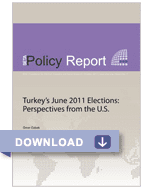
Turkey’s June 2011 Elections: Perspectives from the U.S.
October 10, 2011On June 12, 2011 general elections for the parliament (Turkish Grand National Assembly) were held in Turkey.
On June 12, 2011 general elections for the parliament (Turkish Grand National Assembly) were held in Turkey. The Justice and Development Party (AK Party) won the general elections with 49 percent of the votes to run the office for a third term with a few seats short of supermajority in the parliament. The elections carry historic significance as an affirmation of the Turkish political system as a consolidated democracy with political stability and strong economic growth.The elections received the highest coverage on an issue related to Turkey in the U.S. media and the think tank community. In a span of two weeks, more than 20 articles appeared in major newspapers and magazines and around 50 analyses were published by experts in think tanks in addition to commentaries at eight panel discussions held in Washington, D.C. This report provides a comparative analysis of perceptions on Turkey’s June 2011 elections among U.S. opinion makers. Similar comments on these issues by the majority of the analysts are overviewed under a general perspective while the distinct perspectives are referenced to their authors. This report also examines the overlooked or misinterpreted parts of the picture and provides background information.
In general, four major issues dominated the commentaries on elections: Performance of political parties, the new constitution, the Kurdish issue and foreign policy. All commentators expected the AK Party to receive the highest vote among all parties and the discussions revolved around the distribution of votes and reconfiguration in parliament seats. Many analysts seemed uneasy about a supermajority by the AK Party in the parliament in light of discussions on drafting a new constitution. As the AK Party “failed” to get such a majority, most of these commentators seemed relieved. On the other hand, it seems that the Republican People’s Party (CHP) with its new leadership captured some attention in the U.S. and was seen as a credible alternative to the AK Party by some analysts. Its performance in the elections was a disappointment for these analysts while some others –despite its anti-American rhetoric– welcomed the MHP’s success in surpassing the 10 percent national threshold as it kept AK Party below a supermajority. Additionally, all of the commentators acknowledged the need for a new, civilian constitution in Turkey; however, most of the commentaries were limited to discussions on the possible establishment of presidential system in Turkey. Turkey’s long-standing Kurdish issue was also mentioned in the commentaries as a major issue that awaited a comprehensive solution. Most of the analysts commenting on this issue ran into the pitfall of identifying all the Kurdish electorate with the BDP and overlooked the support for the AK Party among Kurds. Turkish foreign policy, an increasingly-discussed issue in Washington circles, was another major subject of these commentaries as the Middle East has been going through an unpredictable revolutionary process. Turkey’s policies and relations with neighbors were depicted as going through a serious test as Turkey would have to come up with new policies in this dynamic process.
The rulings of Turkey’s Supreme Election Board (YSK) on the candidacy of some controversial figures and detained members of the parliament, and the oath-taking crisis after the elections are both complicated issues hardly seen in other democracies. Limited comments and news articles were published on these issues in the U.S.; thus, a comprehensive analysis is provided at the end of this report to help readers grasp the background on these issues.




























